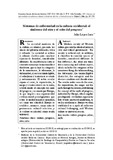| dc.rights.license | http://creativecommons.org/licenses/by-nc-sa/3.0/ve/ | |
| dc.contributor.author | López Saco, Julio | |
| dc.date.accessioned | 2012-03-29T20:53:35Z | |
| dc.date.available | 2012-03-29T20:53:35Z | |
| dc.date.issued | 2012-03-29T20:53:35Z | |
| dc.identifier.issn | 1316-1369 | |
| dc.identifier.uri | http://www.saber.ula.ve/handle/123456789/34766 | |
| dc.description.abstract | La sociedad moderna de
la cultura occidental, presenta los
ideales del gobierno ordenado, cívico
y refi nado. La sociedad se ordena
y, además clasifica para canalizar
espacios de desorden, considerados
diferentes. En esta diferencia el otro se
convierte en un aspecto amenazador y
disolvente, que incluye las categorías
de lo monstruoso, lo inhumano, la
deformidad, el carácter ininteligible,
el salvajismo y la ausencia se estado
y ordenamiento. El orden secular
supera el error, la superstición, la
magia y el mito a través de la razón,
estableciendo el concepto del mito
del progreso, encarnado por Europa,
lo que implica una superioridad
civilizacional paradigmática que
evita la multiformidad mundial,
así como una alteridad. Europa se
establece, entonces, como mito de
pertenencia cultural colectiva, y
la cultura occidental como razón
universal. | es_VE |
| dc.language.iso | es | es_VE |
| dc.rights | info:eu-repo/semantics/openAccess | |
| dc.subject | Cultura | es_VE |
| dc.subject | Progreso | es_VE |
| dc.subject | Otro | es_VE |
| dc.subject | Mito | es_VE |
| dc.title | Síntomas de enfermedad en la cultura occidental: el síndrome del otro y el mito del progreso | es_VE |
| dc.title.alternative | Symptoms of illness in western culture: the syndrome of Other and the myth of progress | es_VE |
| dc.type | info:eu-repo/semantics/article | |
| dc.description.abstract1 | Modern society of Western
culture, presents the ideals of ordered,
civic and refi ned government. The
society is ordered and, in addition,
it classifies to canalize spaces of
disorder, considered different. In
this difference, the other one turns
into a menacing and solvent aspect,
which includes the categories of the
monstrous thing, the inhuman thing,
the deformity, the unintelligible
character, the savagery and the
absence condition and classifi cation.
The secular order exceeds the error,
the superstition, the magic and the
myth through the reason, establishing
the concept of the myth of progress,
embodied by Europe, which implies
paradigmatic civilization superiority
that avoids universal multiform, as
well as an otherness. Europe was then
established as a myth of collective
cultural belonging, and Western
culture as universal reason. | es_VE |
| dc.description.colacion | 367-376 | es_VE |
| dc.description.email | yogonbus@hotmail.com | es_VE |
| dc.description.frecuencia | semestral | |
| dc.identifier.depositolegal | 196602ME301 | |
| dc.subject.facultad | Facultad de Humanidades y Educación | es_VE |
| dc.subject.keywords | Culture | es_VE |
| dc.subject.keywords | Progress | es_VE |
| dc.subject.publicacionelectronica | Revista Presente y Pasado | |
| dc.subject.seccion | Revista Presente y Pasado: Artículos | es_VE |
| dc.subject.thematiccategory | Artes y Humanidades | es_VE |
| dc.subject.tipo | Revistas | es_VE |
| dc.type.media | Texto | es_VE |


